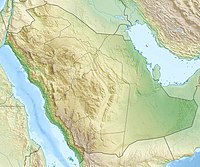Abu Qubays (mountain)
| Jabal Abū Qubays | |
|---|---|
| Jabal Abī Qubays | |
 A view of Mecca Clock Tower from the side of Jabal Abi Qubays | |
| Highest point | |
| Coordinates | 21°25′22″N 39°49′44″E / 21.42278°N 39.82889°E |
| Naming | |
| Native name | |
| Geography | |
| Location | Mecca, Makkah Province, Hejaz, Saudi Arabia |
| Parent range | Hijaz Mountains |
Abu Qubays (Arabic: جَبَل أَبُو قُبَيْس \ جَبَل أَبِي قُبَيْس, romanized: Jabal Abū Qubays / Jabal Abī Qubays) is a sacred mountain which resides on the eastern frontier of Al-Masjid Al-Haram in Mecca,[1] in the Hejaz region of Saudi Arabia.
Description
[edit]
Although the exact origin of its name is unknown, it is believed to be called Al-Amīn (ٱلْأَمِيْن) in pagan times because the sacred Black Stone resided there according to Muslims[who?]. According to another report, this mountain was also called the Maghārat al-Kanz (مَغَارَة ٱلْكَنْز, "Treasure Cave"), and this was believed to be the place where the first of men stayed and were buried after their death. According to tradition, this is the place where the Islamic Nabi, Prophet Muhammad performed the miracle of splitting the Moon into two pieces and then re-attaching those pieces as demanded by the disbelievers of Makkah.[1]
See also
[edit]References
[edit]External links
[edit]- Jabal Abu Qubais (Mount Abu Qubais) (Islamic Landmarks)
- Jabal Abu Qubais (Hajj & Umrah Planner)
- 8 Facts about the Mountain of Abu Qubais – the first mountain created by Allah
- 7 facts of Mountain Abu Qubais - The first Mount created by Almighty Allah
- Makkah Live Drone View | Jabal abu qubais | Makkah Live | Reality Of Islam (YouTube)
- jabal abu qubais
- Jabal e Abu Qubais Kahan Hai - Maulana Ilyas Qadri - Short Bayan
- جبال مكة | جبل أبو قبيس (Arabic)







